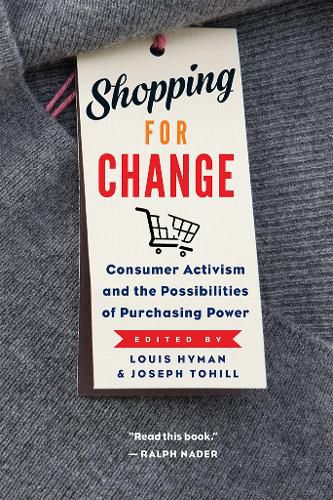Readings Newsletter
Become a Readings Member to make your shopping experience even easier.
Sign in or sign up for free!
You’re not far away from qualifying for FREE standard shipping within Australia
You’ve qualified for FREE standard shipping within Australia
The cart is loading…






Consuming with a conscience is one of the fastest growing forms of political participation worldwide. Every day we make decisions about how to spend our money and, for the socially conscious, these decisions matter. Political consumers buy green for the environment or they buy pink to combat breast cancer. They boycott Taco Bell to support migrant workers or Burger King to save the rainforest. But can we overcome the limitations of consumer identity, the conservative pull of consumer choice, co-optation by corporate marketers, and other pitfalls of consumer activism in order to marshal the possibilities of consumer power? Can we, quite literally, shop for change? Shopping for Change brings together the historical and contemporary perspectives of academics and activists to show readers what has been possible for consumer activists in the past and what might be possible for today’s consumer activists. Contributors Kyle Asquith, University of Windsor; Dawson Barrett, Del Mar College; Lawrence Black, University of York; Madeline Brambilla, Northeastern University; Joshua Carreiro, Springfield Technical Community College, Springfield, MA; H. Louise Davis, Miami University; Jeffrey Demsky, San Bernardino Valley College; Tracey Deutsch, University of Minnesota-Twin Cities; Mara Einstein, Queens College, CUNY; Bart Elmore, University of Alabama; Sarah Elvins, University of Manitoba; Daniel Faber, Northeastern University; Julie Guard, University of Manitoba; Louis Hyman, ILR School, Cornell University; Meredith Katz, Virginia Commonwealth University; Randall Kaufman, Miami Dade College-Homestead Campus; Larry Kirsh, IMR Health Economics, Portland, OR; Katrina Lacher, University of Central Oklahoma; Bettina Liverant, University of Calgary; Amy Lubitow, Portland State University; Robert N. Mayer, University of Utah; Michelle McDonald, Stockton University; Wendy Wiedenhoft Murphy, John Carroll University; Mark W. Robbins, Del Mar College; Jessica Stewart, Cornell University;Joseph Tohill, York University and Ryerson University; Allison Ward, Queen’s University and McMaster University; Philip Wight, Brandeis University
$9.00 standard shipping within Australia
FREE standard shipping within Australia for orders over $100.00
Express & International shipping calculated at checkout
Consuming with a conscience is one of the fastest growing forms of political participation worldwide. Every day we make decisions about how to spend our money and, for the socially conscious, these decisions matter. Political consumers buy green for the environment or they buy pink to combat breast cancer. They boycott Taco Bell to support migrant workers or Burger King to save the rainforest. But can we overcome the limitations of consumer identity, the conservative pull of consumer choice, co-optation by corporate marketers, and other pitfalls of consumer activism in order to marshal the possibilities of consumer power? Can we, quite literally, shop for change? Shopping for Change brings together the historical and contemporary perspectives of academics and activists to show readers what has been possible for consumer activists in the past and what might be possible for today’s consumer activists. Contributors Kyle Asquith, University of Windsor; Dawson Barrett, Del Mar College; Lawrence Black, University of York; Madeline Brambilla, Northeastern University; Joshua Carreiro, Springfield Technical Community College, Springfield, MA; H. Louise Davis, Miami University; Jeffrey Demsky, San Bernardino Valley College; Tracey Deutsch, University of Minnesota-Twin Cities; Mara Einstein, Queens College, CUNY; Bart Elmore, University of Alabama; Sarah Elvins, University of Manitoba; Daniel Faber, Northeastern University; Julie Guard, University of Manitoba; Louis Hyman, ILR School, Cornell University; Meredith Katz, Virginia Commonwealth University; Randall Kaufman, Miami Dade College-Homestead Campus; Larry Kirsh, IMR Health Economics, Portland, OR; Katrina Lacher, University of Central Oklahoma; Bettina Liverant, University of Calgary; Amy Lubitow, Portland State University; Robert N. Mayer, University of Utah; Michelle McDonald, Stockton University; Wendy Wiedenhoft Murphy, John Carroll University; Mark W. Robbins, Del Mar College; Jessica Stewart, Cornell University;Joseph Tohill, York University and Ryerson University; Allison Ward, Queen’s University and McMaster University; Philip Wight, Brandeis University